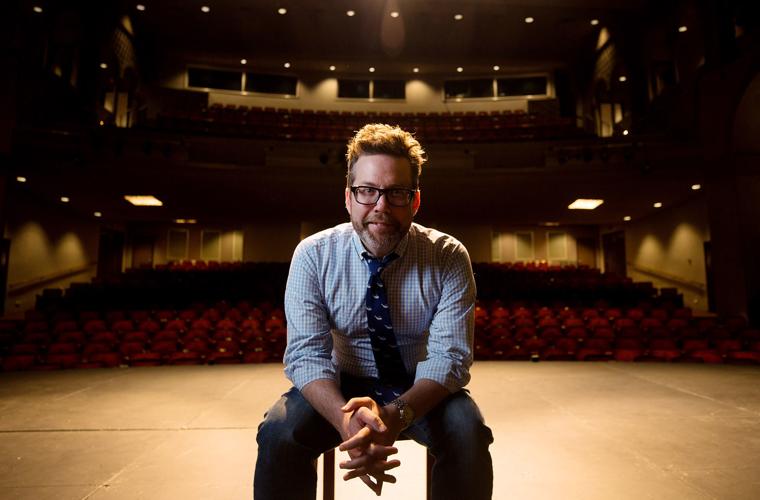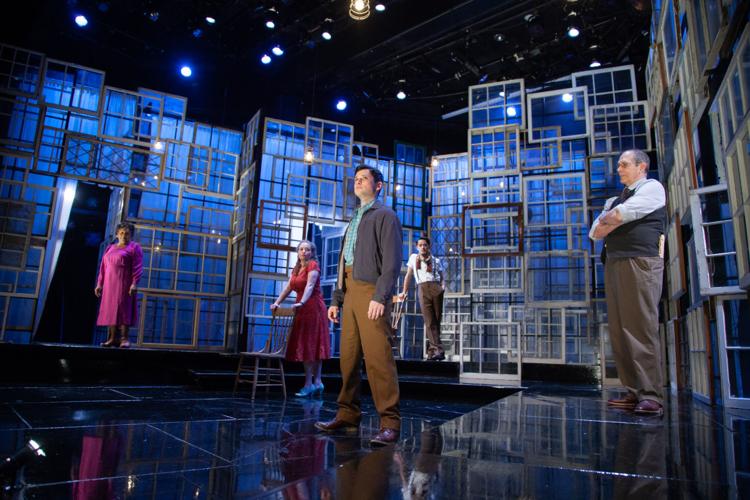If Sean Daniels has his way, Arizona Theatre Company will soon have a national reputation. Maybe even an international one.
ŌĆ£My goal is for ATC to be the local theater that the country, if not the world, pays attention to,ŌĆØ says Daniels, who became ATCŌĆÖs artistic director in mid-May.
Dressed casually, he settles into a red velvet seat in the empty Temple of Music and Art theater.
ŌĆ£We do fantastic work here,ŌĆØ says Daniels. ŌĆ£The problem is, you donŌĆÖt see it anywhere else. So we need to start figuring out how we move the work that we do to other cities, other states. And we need to develop new plays here that go on to the rest of the world.ŌĆØ
Daniels is well on his way to doing that.
Developing new works
This summer, ATC will workshop the likely-Broadway-bound Hall & Oates jukebox musical by Chris DŌĆÖArienzo, creator of the hit musical ŌĆ£Rock of Ages.ŌĆØ
People are also reading…
ŌĆ£Part of the deal is we do a workshop here and then Arizona Theatre Company will have the first rights of refusal to do the world premiere of it before it then goes on to Broadway,ŌĆØ says Daniels of the play, which has the working titles ŌĆ£ManeaterŌĆØ and ŌĆ£Untitled Hall and Oates Project.ŌĆØ
The play will likely be workshopped here in July or early August, says Daniels. And yes, the public can attend.
Workshopping a play can be anything from helping a playwright develop an idea to trial performances, sans costumes and sets. This Hall and Oates musical, which is almost ready for full productions, has been workshopped since 2017, and Daniels has been involved since the beginning.
And thatŌĆÖs not all.
ŌĆ£We have a bunch of playwrights that weŌĆÖre already committed to in terms of bringing them in for workshops,ŌĆØ says Daniels.
One of them is Lauren Gunderson, whose play ŌĆ£Silent SkyŌĆØ will be staged by the ATC in October. Last year, she was the most produced playwright in the country.
ŌĆ£She wants to work on a new all-female ŌĆśHamletŌĆÖ from a feminist perspective,ŌĆØ says Daniels, 46. ŌĆ£So weŌĆÖll workshop it here and if it goes well, weŌĆÖll do the world premiere here.ŌĆØ
Others interested in workshopping new plays at ATC: Marco Ramirez, whose play ŌĆ£The RoyaleŌĆØ opens the ATC season; musical composer Brian Loudermilk, and playwrights Steven Druckman, Steve Yockey and Vichet Chum. If the names are not familiar, they may be soon ŌĆö all are young up-and-comers whose works have appeared around the country.
Developing new works is important to Daniels.
In his nearly five years as artistic director at Merrimack Repertory Theatre in Lowell, Mass., he had 14 world premieres, two of which transferred to off-Broadway. The Daniels-penned ŌĆ£The White Chip,ŌĆØ heads to off-Broadway in the fall, with ATC as the affiliated nonprofit theater. He also adapted the Jack Kerouac novel ŌĆ£The Haunted Life,ŌĆØ which Merrimack premiered earlier this year. There is talk of taking that to Broadway.
ŌĆ£You can either have New York telling you what youŌĆÖll be seeing in two or three years, or you can be doing shows before New York,ŌĆØ says Daniels. ŌĆ£In the past weŌĆÖve done a lot of solid work, but itŌĆÖs been a lot of what New York did three years ago. IŌĆÖm ready to start saying that great theater in our country starts in Arizona. That plays go from here and then go to New York. Or not even New York, but to the rest of the country.ŌĆØ
Professional theater, community feel
While Daniels is set on building a national reputation, he is focused in on building community here and in Phoenix.
Daniels will continue the Arizona Initiative, ATCŌĆÖs push to give more theater artists from the state a presence on stage and behind the scenes.
And he plans to bring the Cohorts program he first started at Merrimack to the Old Pueblo.
ŌĆ£We will get 20 community members (in both Tucson and Phoenix) and invite them into the theater. They can attend all rehearsals and all production meetings,ŌĆØ Daniels says.
The idea is to give those interested an inside look at what it takes to stage a play. The only obligation for Cohorts members: They have to write about the experience, which will be shared through such avenues as ATCŌĆÖs website.
ThereŌĆÖs a program, too, for unhappy audience members. Daniels calls it the Confabulation.
ŌĆ£It means to change someoneŌĆÖs memory of the past,ŌĆØ he explains.
HeŌĆÖll bring together people who liked and disliked the same play, and they can exchange ideas about what worked and didnŌĆÖt work for them.
What he wants, he says, is a community theater vibe.
ŌĆ£In community theater, everybody roots for the show, everyone bakes for opening night,ŌĆØ Daniels said. ŌĆ£In professional theater, nobody bakes. It treats itself as though itŌĆÖs an elitist art form. I want the community to own it. I want them to feel this is a Tucson theater, theyŌĆÖre invited in, they root for it.ŌĆØ
Planning a season
ŌĆ£I think of a season like putting together a great dinner party,ŌĆØ says Daniels. ŌĆ£One loud guy is a lot of fun, two loud guys will destroy it. I want audiences to think ŌĆ” that everything we put on stage is world-class and that it is exactly what you would get at the best theater anywhere else in the country, but itŌĆÖs in your city and it is built here for you.ŌĆØ
Daniels doesnŌĆÖt plan on selecting a season on his own.
HeŌĆÖll pull people from the community to help. The group will read scripts over a six-month period and come together to discuss the plays and what might work on the ATC stage. He is determined to have members on that committee from groups that are generally underrepresented in ATCŌĆÖs plays.
ŌĆ£The thing I love about season planning with the community is that people finally realize the way it all comes together,ŌĆØ Daniels said. ŌĆ£Which is to say you might eventually read a play that you realize is important for the community, is important for the box office, is important for bringing in new audiences, but that isnŌĆÖt for you and you still understand why we programmed it. And that suddenly opens up an entirely new way of thinking about the work that we do.ŌĆØ
A second stage?
A number of regional theaters have second stages; usually they feature smaller, perhaps more experimental works.
Though the 80-seat Cabaret Theatre at the Temple could provide the space, that is not DanielsŌĆÖ plan.
ŌĆ£I think, for right now, I want to figure out how to bring more people to the work that we do. ŌĆ” I believe in the democratization of art and artistic transparency and I want people to further understand how we do what we do on stage,ŌĆØ Daniels said. ŌĆ£So I guess IŌĆÖm less interested in how to produce more and more than how do we bring people closer into the work that we do.ŌĆØ
The hurdles
Money woes haunt nonprofit theaters around the country, and ATC, whose budget for the 2019-20 season is $8.2 million, hasnŌĆÖt escaped it. The company is dealing with a deficit of about $1.2 million, down from $2.5 million two years ago.
The deficit needs to be dwindled down, but it wonŌĆÖt cripple the ATC, says Daniels, adding that dealing with a deficit is often a fact of life in nonprofit theaters.
Indicators are pointing up, too, he adds. Earned income has increased 32% since the 2015-16 fiscal year, and contributed income has gone up 15% in that time.
ŌĆ£ItŌĆÖs prepped for growth in an amazing way,ŌĆØ Daniels says about the ATC. ŌĆ£ItŌĆÖs growing amidst uncertainty. My job is to provide continuity and to be able to say we have a clear vision for where we want to go.ŌĆØ

















